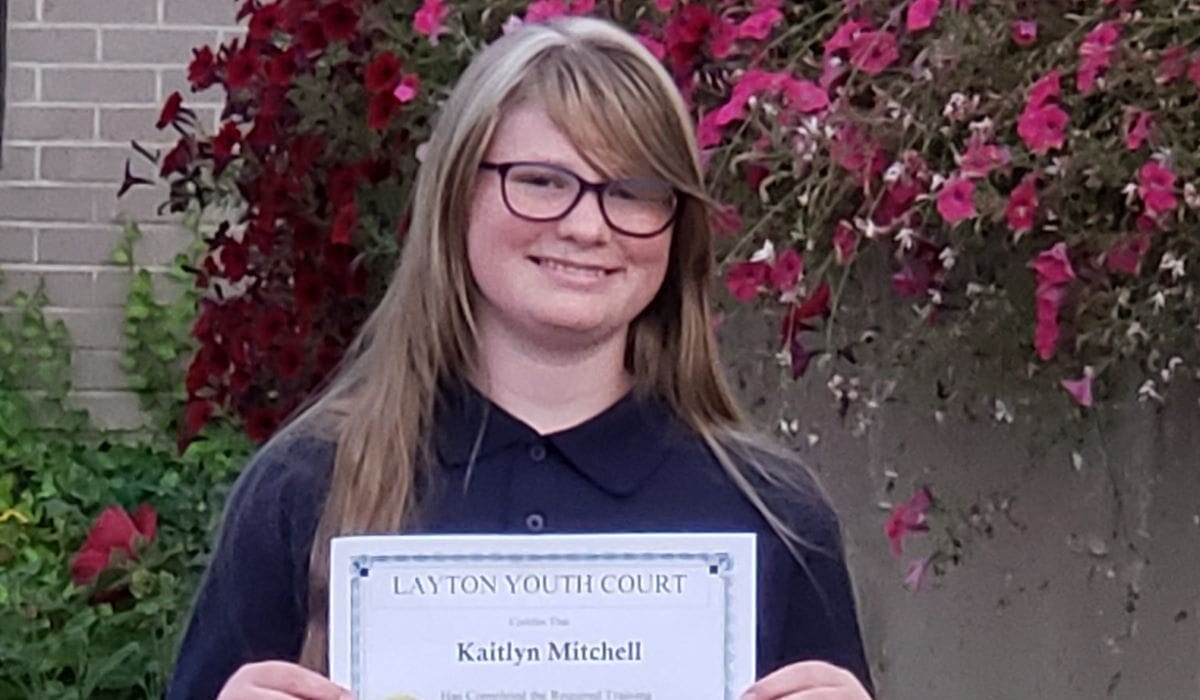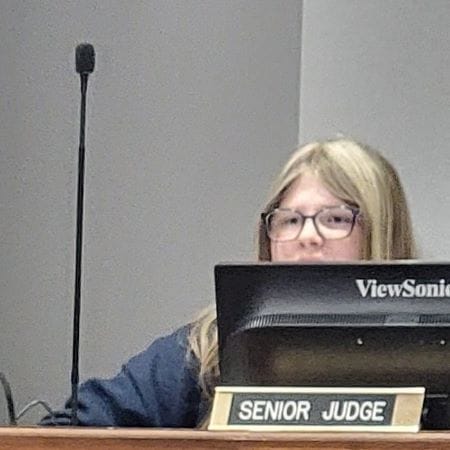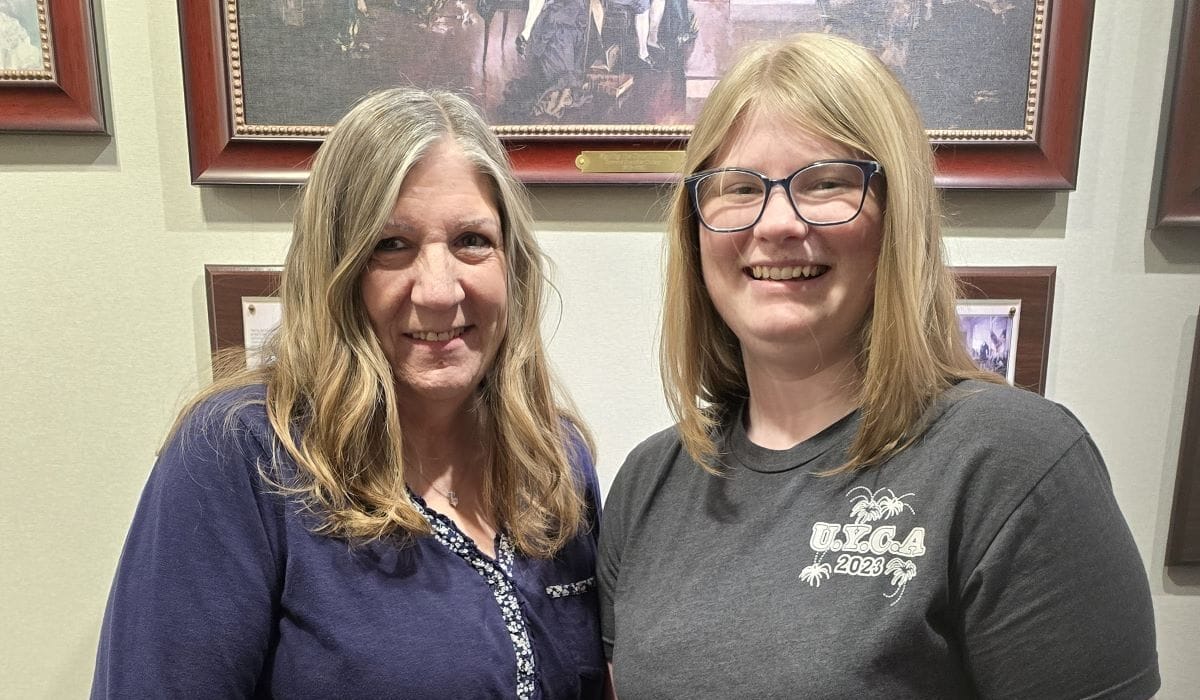Utah Teen Gives Juvenile Defenders a Second Chance

Meet Daily Point of Light Award honoree Kaitlyn Mitchell. Read her story, and nominate an outstanding volunteer or family as a Daily Point of Light.
Kids make mistakes, and some of those mistakes can follow them for the rest of their lives. Kaitlyn Mitchell, 18, innately understands that and wants to take jailtime off the table by giving youth a chance to correct course without carrying the weight of a record. She does this through Layton Youth Court, part of a nationwide diversion program with an emphasis on restorative justice. Kaitlyn joined the organization when she was just 13 years old.
Youth Court is an alternative to the juvenile court system for those in high school and below who admit to minor offences classified as B or C misdemeanors. They are judged by a court of their peers and then handed a disposition ranging from community service to an apology letter.
Even as she starts college, where her passion for art and working with kids has motivated her to study art education, Kaitlyn returns to Youth Court to lend a hand, dedicating over 580 hours of volunteer service.
What inspires you to volunteer?
We moved to Layton (Utah) around 2019. My mom saw a post in the junior high school’s newspaper for Youth Court, and I tried it out. I was shy at the time and thought it would help me get more involved in the community and make friends. I love volunteering there, and working with people my age helped me understand them better.
I have Tourette’s Syndrome and Functional Neurological Disorder (FND). I have tics that make it really hard for me to do things, but they disappear when I’m at Youth Court.
Tell us about your volunteer role with the Layton Youth Court.
We get referrals from police, schools and sometimes parents for kids who have been arrested for anything from marijuana use to assault to arson. They come to Youth Court, and we give them dispositions to help them give back to the community instead of harming it. We want them to be connected, so they don’t feel the urge to act out.

We try not to be punitive with our judgement. We like to give them things that will help them reflect on what they’ve done and how to fix it. It’s a second chance, and after they pass Youth Court—complete the tasks in their disposition—the arrest doesn’t go on their record. For the past two years, we’ve had a 100% completion rate.
I’ve had many different roles, because we switch every week. I’m mostly a senior judge now, but I used to be a judge or bailiff. As a judge, you sit on the panel and ask questions. You get to know the offender and come up with a suitable disposition. As a bailiff, you escort people and serve as traffic control.
We look at the police report. Then, we ask the offender to come in and tell their side of the story, because maybe they were peer pressured into it, or maybe something else happened that day that made them want to do whatever they did.
We also have forms for parents and respondents to fill out in order to get an idea of what they enjoy doing and if there was any punishment beforehand. We don’t want to give them extra. For example, if they’ve already done community service, we don’t want to give them more.
I’ve also been a CHOICES Expert. I taught a class to offenders we felt needed to make better choices and learn about emotion management—anger, fear or peer pressure. We educate them on drug use and other things, too. And I’ve trained kids on panels to teach that class.
You come back as an adult advisor. How does that role differ from the ones you’ve had in the past?
I get to do what Karlene has done for the last 26 years. She runs all of the Youth Court, and I get to help. I bounce from panel to panel. Right now, we’re running three at a time, because we’re so full. Usually, we only run one or two. The minimum is three on a panel: a senior judge, a clerk and a bailiff. The clerk does paperwork. The senior judge is the head honcho, and the bailiff brings them in and out of the room and gives the confidentiality oath.
I help wherever I can. Sometimes, I act as a youth. If we don’t have enough people, I fill in as a senior judge. And if anyone has questions on things like how to fill out paperwork or certain rules, I can help. I can also teach CHOICES trainings.
What’s been the most rewarding part of your work?
We’ve had kids go through Youth Court as offenders who come back and join our panel on the other side. It’s so rewarding to see how they made a simple mistake, and we help them fix it. They recognize it and never do it again.

What have you learned through your experiences as a volunteer?
I’ve learned a lot about myself and to be more outgoing. I’ve also learned a lot about the legal system through a yearly Youth Court conference.
Why is it important for others to get involved with causes they care about?
Most of the kids who come into Youth Court don’t really care about their community. That’s why they act out. They don’t think people care about them or what they do. By connecting to their community, they realize there’s something to care about, and there are more people to connect with.
What do you want people to learn from your story?
Through my disability, I’ve learned to advocate for myself. And by doing that, I’ve learned that I can pretty much do anything any “normal” person can do. You might think you can’t do it, but you can.
Do you want to make a difference in your community like Kaitlyn? Find local volunteer opportunities.